Impact of an education intervention focusing on comprehensive mindful eating and chewing habits on daily eating practices: A mobile tool-based randomized controlled trial
IF 2.4
3区 医学
Q2 PSYCHIATRY
引用次数: 0
Abstract
Background
Mindful eating (ME) emphasizes full awareness of food consumption, incorporating the practice of eating slowly. Traditional interventions targeting slower eating rates often concentrate on chewing behavior, leaving the impact of ME largely unexplored. The objective of this study was to evaluate the effectiveness of the ME program in improving eating rates and mindful eating compared to conventional education centered solely on chewing.
Methods
A total of 66 women university students were randomly assigned to either the ME (n = 33) or chewing intervention groups (n = 33). Education programs were delivered via smartphones over 8 weeks, with bi-weekly sessions where participants watched videos individually. The primary outcome was the eating rate, while the secondary outcome were eating style and the Mindful Eating Questionnaire (MEQ) assessed through web-based questionnaires. Measurements were taken pre-intervention, post-intervention, and at 1 and 3 months follow-up. Statistical analysis was conducted using intention-to-treat analysis.
Results
Both the ME and chewing groups showed slower eating rates compared to baseline, indicating the effect's temporal persistence, with no significant differences found between them at the end of the intervention and at 1 and 3 months post-intervention. In addition, the ME group significantly increased the MEQ scores compared to the chewing group.
Conclusion
The educational program using ME reduced the rate of eating and achieved results similar to those of programs focused solely on chewing. Furthermore, it was effective in increasing MEQ scores. Based on these findings, a comprehensive education program that focuses on ME is recommended.
以全面注意饮食和咀嚼习惯为重点的教育干预对日常饮食习惯的影响:基于移动工具的随机对照试验
背景正念进食(ME)强调充分意识到食物的消耗,并将慢慢进食的做法融入其中。传统的针对减缓进食速度的干预措施通常集中在咀嚼行为上,而 ME 的影响在很大程度上尚未得到探讨。本研究的目的是评估 ME 计划在提高进食率和有意识进食方面的效果,并与仅以咀嚼为中心的传统教育进行比较。方法:66 名女大学生被随机分配到 ME 组(33 人)或咀嚼干预组(33 人)。教育课程通过智能手机进行,为期8周,每两周一次,参与者单独观看视频。主要结果是进食率,次要结果是进食方式和通过网络问卷评估的正念进食问卷(MEQ)。测量分别在干预前、干预后、1 个月和 3 个月的随访中进行。结果与基线相比,ME 组和咀嚼组的进食速度都有所减慢,这表明该效果具有时间持续性,在干预结束时以及干预后 1 个月和 3 个月,这两组之间没有发现显著差异。此外,与咀嚼组相比,ME 组的 MEQ 分数明显提高。此外,它还能有效提高 MEQ 分数。基于这些研究结果,建议开展以 ME 为重点的综合教育计划。
本文章由计算机程序翻译,如有差异,请以英文原文为准。
求助全文
约1分钟内获得全文
求助全文
来源期刊

Eating behaviors
Multiple-
CiteScore
4.20
自引率
3.60%
发文量
65
审稿时长
60 days
期刊介绍:
Eating Behaviors is an international peer-reviewed scientific journal publishing human research on the etiology, prevention, and treatment of obesity, binge eating, and eating disorders in adults and children. Studies related to the promotion of healthy eating patterns to treat or prevent medical conditions (e.g., hypertension, diabetes mellitus, cancer) are also acceptable. Two types of manuscripts are encouraged: (1) Descriptive studies establishing functional relationships between eating behaviors and social, cognitive, environmental, attitudinal, emotional or biochemical factors; (2) Clinical outcome research evaluating the efficacy of prevention or treatment protocols.
 求助内容:
求助内容: 应助结果提醒方式:
应助结果提醒方式:


